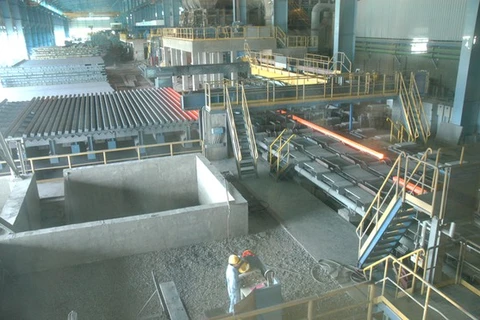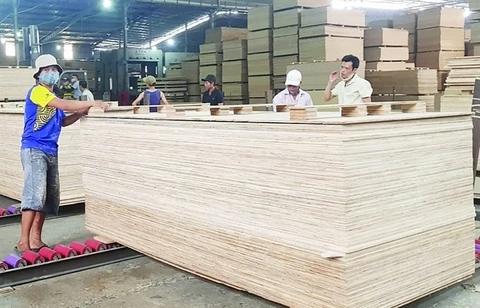 Mobile phone recharging cables imported from China but labelled “Made in Vietnam” are seized by the customs force in the northern port city of Hai Phong in July 2019. (Photo: VietnamPlus)
Mobile phone recharging cables imported from China but labelled “Made in Vietnam” are seized by the customs force in the northern port city of Hai Phong in July 2019. (Photo: VietnamPlus) Hanoi (VNA) - The fraudulent practice of giving foreign goods a fake Vietnam origin in an illegal attempt to take advantage of the Government’s export tax incentives is not only causing direct damage to the country’s economy but also adversely affecting the products’ reputation and trademark, making it a subject of anti-dumping lawsuits.
Question: Fraudulent practices are getting trickier every day. Can you tell us some of the types of origin-related fraud?
Mr. Dam Thanh The: Goods with fake Vietnam origin can be easily made in a foreign country and then labelled “Made in Vietnam”. Products like this are often illegally trafficked into Vietnam via border trails.
They could also be imports whose original labels are immediately replaced with those for domestically-made goods upon arrival.
Another form is non-labelled products smuggled into Vietnam.
There are also some people who establish several companies that appear to produce different types of components for making complete products, which are then labelled Made in Vietnam.
Question: Vietnam has joined many free trade agreements (FTAs), most recently the EU-Vietnam FTA (EVFTA) and the Comprehensive and Progressive Agreement for Trans-Pacific Partnership (CPTPP). Is this a cause of the increasing number of fraudulent origin goods?
Mr. Dam Thanh The: Vietnam’s participation in various FTAs has resulted in more incentives for Vietnamese goods than for those from the countries without such agreements. Some foreign producers have committed origin fraud to enjoy Vietnam’s tax incentives or distribute the products in Vietnam for illegal profits.
Question: What are the other reasons for this to remain a pressing issue in Vietnam despite the efforts of relevant agencies?
Mr. Dam Thanh The: Under the orientations and policies of the Party and State, Vietnamese firms have invested heavily in creating valuable brands. The “Vietnamese people prioritise Made-in-Vietnam goods” campaign, in particular, is credited for having been boosting the competitiveness of locally-made products by instilling a preference for high-quality domestic goods among locals.
 A container of Chinese-imported mobile phone components and accessories with the “Made in Vietnam” label is detected by the Hai Phong customs force in July 2019 (Photo: VietnamPlus).
A container of Chinese-imported mobile phone components and accessories with the “Made in Vietnam” label is detected by the Hai Phong customs force in July 2019 (Photo: VietnamPlus). Question: What damage does this fraud cause to Vietnam amid its global economic integration process?
Mr. Dam Thanh The: These counterfeits cost Vietnam its reputation on the international stage. Once uncovered, the crime is punished under international law but has a direct impact on consumers and Vietnamese enterprises.
Question: What is the greatest obstacle facing authorities in handling the issue?
Mr. Dam Thanh The: Many use several tricks to sneak fake goods into the country and then distribute them, while relevant agencies, including the customs force, must take on various tasks apart from combating counterfeit goods.
Question: What measures has National Steering Committee 389 taken to deal with this fraud?
Mr. Dam Thanh The: It regularly advises the Government and the Prime Minister on developing strategies to combat smuggling, trade fraud, and counterfeit goods, particularly origin fraud.
The committee’s Plan No 19 was signed on July 23, 2019, directing ministries, sectors such as the customs force, and localities to focus on cracking down on the exploitation of Vietnam origin, particularly illegal trans-shipments.
After more than a year implementing the plan, responsible forces, including the customs force, have pooled efforts in the fight and uncovered a large number of cases./.






















